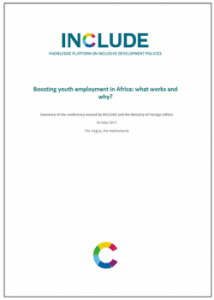
The future of work reflects the changes taking place in global labour market structures, which are expected to stimulate entrepreneurship and job creation, but only for those with adequate skills. In Tunisia, the rise of automation has led to a decline in demand for manual labour. Consequently, an increased number of young Tunisians are seeking to start their own business, however, they are constrained by a lack of finance. According to our research, angel investment funds can help bridge this financial gap. In addition, stimulating entrepreneurship will help youth obtain the necessary skills to meet the challenges associated with the changing nature of the future of work. Hence, we call on the Dutch government to join forces with the Tunisian government and Carthage Business Angels to support the establishment of an angel investment fund.
The challenge of the future of work in Tunisia
The future of work encompasses the changes in global labour market structures through the growing influence of automation, robotization, and artificial intelligence. In this new world, the youth in Tunisia lack the socio-behavioural and entrepreneurial skills to compete for tomorrow’s jobs. Starting a business would increase their chance of obtaining these skills, however, lack of finance opportunities is a major constraint. Tunisian entrepreneurs have trouble finding adequate financing for investments in the range of USD 20,000 to 500,000. The businesses in this range are both risky and promising to invest in. Other, more conventional finance institutions, such as banks or venture capitalists, do not usually invest in businesses in this range, or demand large amounts of collateral to do so. A new funding instrument is needed to close this financing gap.
TAIF
One of the main reasons for this finance gap is risk – so to reduce risk and bridge this gap we suggest establishing the Tulip Angel Investment Fund (TAIF). A recommended co-investment structure of the Fund would allow multiple partners to share the risk, stimulating investment. It is envisioned that this fund would be managed by the Dutch and Tunisian governments, together with Tunisian ‘business angels’. Business angels are experienced entrepreneurs who teach young entrepreneurs the necessary skills, while also investing in their ventures. Therefore, TAIF would not only focus on finance, but also on directly giving young people the entrepreneurial skills they need to compete for tomorrow’s jobs.
The Tulip Angel Investment Fund (TAIF)
Suggested structure of the fund
TAIF’s disposable capital could be provided by the  Dutch Ministry of Foreign Affairs, the Tunisian government, Tunisian business angels and other potential sponsors (governments or financial institutions). Crucially, a representative of each group would be part of the four-member board of directors in charge of the executive decisions of the fund. The fund would have three divisions: investment in entrepreneurial ventures, training young entrepreneurs, and training business angels.
Dutch Ministry of Foreign Affairs, the Tunisian government, Tunisian business angels and other potential sponsors (governments or financial institutions). Crucially, a representative of each group would be part of the four-member board of directors in charge of the executive decisions of the fund. The fund would have three divisions: investment in entrepreneurial ventures, training young entrepreneurs, and training business angels.
Investment in entrepreneurial ventures
This division would be in charge of funding young Tunisian start-ups. Here, already trained or experienced business angels would help young Tunisian entrepreneurs to scale up their business model by providing them with the necessary finance and mentorship.
Training young Tunisian entrepreneurs
This division would be in charge of training entrepreneurs who are not yet receiving funding. Once entrepreneurs complete this training, they would be eligible to apply to TAIF’s investment division and receive funding and mentorship. The training would be financed by the fund and conducted by business angels or external instructors.
Training business angels
This division would be in charge of training investors – individuals who have the necessary monetary capacity and potential to become business angels, but have not yet obtained the skills to do so. Furthermore, business angels would be supported in acquiring the licence they need to operate. Their training would be paid for by the investors (in or outside Tunisia) signed up to the programme. The revenue would flow back into the fund.
To establish the TAIF, our idea is to build on the existing network of Carthage Business Angels, an angel investment group based in Tunisia. Their network has the capacity to assemble the pool of potential partners necessary for such a fund. However, more partners willing to financially contribute to the fund would still need to be actively recruit. Furthermore, the continued economic diplomacy efforts of the Dutch Embassy in Tunisia could aid in developing our idea. It is hoped that the concerned parties will consider our suggestion to give Tunisian youth a chance for a better future.

